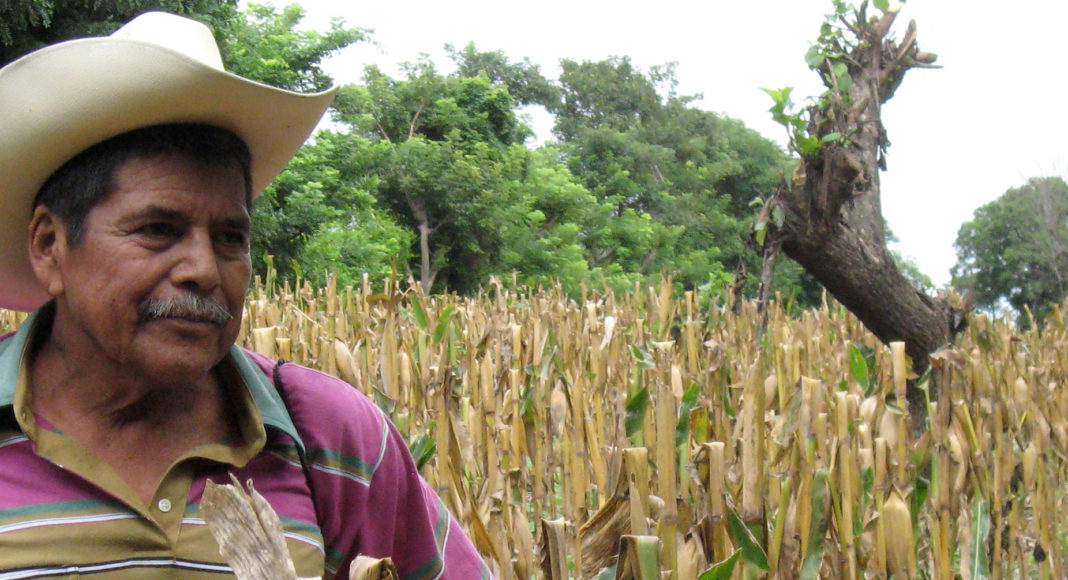The new FMLN-led government of President Sánchez Cerén in El Salvador appears to have won a small but significant victory in trade negotiations with the US. It may not be compelled to re-run the tendering for seed contracts in order to favour Monsanto and other suppliers of GM maize.
The US Embassy had been pressing the Salvadorean government to sign up to its Millennium Challenge Compact (MCC). This includes aid which is effectively tied to the purchase of GM maize seed, most of it Monsanto products.
This strategy was allegedly being promoted by Michael R. Taylor, a former VP of Public Policy at the Monsanto Corporation, who was appointed by President Obama as Deputy Commissioner for Foods at the U.S. Food and Drug Administration (FDA).
In an article for Truthout, Dahr Jamail explains how the US Government has worked on behalf of multinational companies like Monsanto in pushing their GM products onto the governments of El Salvador and other countries, citing a report by the Washington-based NGO Food and Water Watch.
In 2013 the US government threatened to cancel US$277m in aid via MCC unless El Salvador made specific changes to the way it provides seed to farmers. The US Embassy in San Salvador contended that the FMLN Government’s Family Agriculture Plan gave favourable treatment to local farmers and seed developers and excluded or disadvantaged US companies such as Monsanto.
The US contends that El Salvador violated the ‘open competition’ arrangements enshrined in CAFTA-DR, the Central American Free Trade Agreement signed up to in 2004 by the US, the Central American countries and the Dominican Republic.
The Salvadorean programme benefits local co-ops (who produce non-GM maize seed) and family and small scale farmers who get the free, excellent quality maize seed, specifically adapted to local conditions, to increase production and tackle poverty and hunger.
 One of the small local projects which benefited from this programme is Cooperativa Nuevo Modelo de Esperanza (New Model of Hope) in the Bajo Lempa region. LAB described the work of this farm co-operative, which is producing non-GM maize seed here. The co-op provides employment for up to 60 workers and produces the H59 Esperanza maize variety. You can see them at work in this video. The Nueva Esperanza co-operative is now featured in a LAB Blog.
One of the small local projects which benefited from this programme is Cooperativa Nuevo Modelo de Esperanza (New Model of Hope) in the Bajo Lempa region. LAB described the work of this farm co-operative, which is producing non-GM maize seed here. The co-op provides employment for up to 60 workers and produces the H59 Esperanza maize variety. You can see them at work in this video. The Nueva Esperanza co-operative is now featured in a LAB Blog.
Another Bajo Lempa farmer, Juan Joaquin Luna Vides, who heads the Diversified Production Programme at the Mangrove Association, told Truthout that “transnational companies have been known to provide expired seeds that they weren’t able to distribute elsewhere.” Until recently, he says, small producers didn’t have the opportunity to participate in government seed procurement processes. Now, however, the Salvadorean government’s programme “has generated employment and income for communities, inhabitants and cooperatives of the area, while producers have also greatly developed their capacity to produce certified seed. Catering to transnational companies could hurt these gains that the programme has created.” As many as 15,000 farm workers in the Bajo Lempa area depend for their livelihoods on the affordable local seed varieties.
 According to Jorge Ayala, in an article for IPS, the Salvadorean government seed programme up to 2010 favoured imported seed varieties, with 70% of the market taken by the local Monsanto subsidiary Semillas Cristiani Burkard, the family business of ARENA leader and former president of El Salvador (1989-94) Alfredo Cristiani.
According to Jorge Ayala, in an article for IPS, the Salvadorean government seed programme up to 2010 favoured imported seed varieties, with 70% of the market taken by the local Monsanto subsidiary Semillas Cristiani Burkard, the family business of ARENA leader and former president of El Salvador (1989-94) Alfredo Cristiani.
Later, the FMLN government changed the bidding process, giving opportunities to local co-operatives, who offered better quality seed at competitive prices. This provoked the wrath of the US Ambassador, Mari Carmen Aponte.
In January 2014, the Salvadorean congress approved a new law which established a bidding process in which international companies could participate. But in the first round in April, the same 18 local producers won, triggering protests from the US Embassy, which complained that the tendering was biased against US companies.
However, according to an article by David Rogers for Politico, liberal Democrats in Congress complained to Secretary of State John Kerry that trade and foreign aid officials were being too heavy-handed in their approach to the issue. And the controversy risked hurting the administration since it distracted attention from Washington’s bigger priority: anti-money-laundering legislation now pending before El Salvador’s legislative assembly.
The GM seed issue is just one of a range of contentious issues arising from NAFTA (and its Central American sibling CAFTA) which threaten efforts by the new Salvadorean government to forge its own path, as discussed by Madeleine Conway in an analysis for the Nation and UpsideDownWorld shortly after Sánchez Cerén’s election victory in March.
To obtain its victory, the Sánchez Cerén government had to provide assurances that it “intends to pursue future corn and bean seed purchases under a mechanism that is transparent, competitive and compliant with Salvadoran law and CAFTA-DR.” So, while a breathing space for El Salvador’s small farmers has been achieved, it iseems clear that further battles will have to be fought to make the advance permanent.

